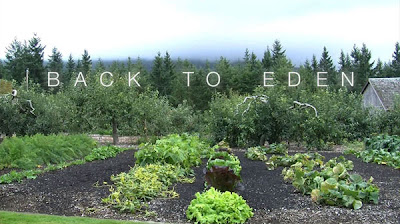
One of the lasting observations from last year's garden was the fact that as the summer months wore on, the ground became so hard and compact that I could barely scratch the surface. Weeding was near impossible and I could not imagine how that was affecting the growth and production of the vegetables. The soil was also light brown and not the dark brown and black that I knew described healthy soil. I began thinking that there must be a better way to garden and not have the soil pay dearly.
Thanks to Jack Spirko at the Survival Podcast, who in turn pointed me to Paul Wheaton at permies.com, I was turned on to permaculture. Using the natural processes found in forests and bringing them into the garden is an extraordinary idea and frankly was one of those "duh" moments for me. One of the core ideas behind permaculture is to keep the rain that falls on an area for as long as possible.
At permies.com, this movie, "Back to Eden" is found all over the forums and I just had to check it out. The movie showcases Paul Gautschi in Washington state and his wonderfully simple idea of using wood chips to do all of the work for him the garden. The wood chips continually nourish and hydrate the soil to create near ideal conditions to grow. The same process can be found in any forest as the dead trees, dead branches and leaves continually lay down a layer of mulch which turns the soil into a huge sponge. This simple idea makes land that is both drought proof and flood proof.
Something like this is so simple that I have got to try it out for this year's garden. Hopefully this will be the cure for the peas wilting in the first heat of summer and keep the blight off of my tomatoes. I do not have to rely on this food yet, so I still have time to experiment. As Joel Salatin says, "If it's worth doing, it's worth doing wrong." You can't be afraid to try something different. Frankly, I don't see a downside to trying this.

I love permaculture! I am trying to recreate a more natural soil structure in my garden beds too... Ruth Stout has a great book on this "Gardening without the work". It may be out of print, but in a nutshell, she recommends piling on the organic matter and claims that after so many layers of hay/straw/wood chips/what have you, incidences of plant disease and destruction by insect pests decreases
ReplyDeleteI cannot recommend permies.com any higher. The wealth of knowledge in that site is enormous. If you are really big into it, there is a permaculture campus in northern Illinois called Midwest Permaculture. They have an 18 part youtube course for beginners. The actual class to become certified is over $1000. One can dream.
Delete